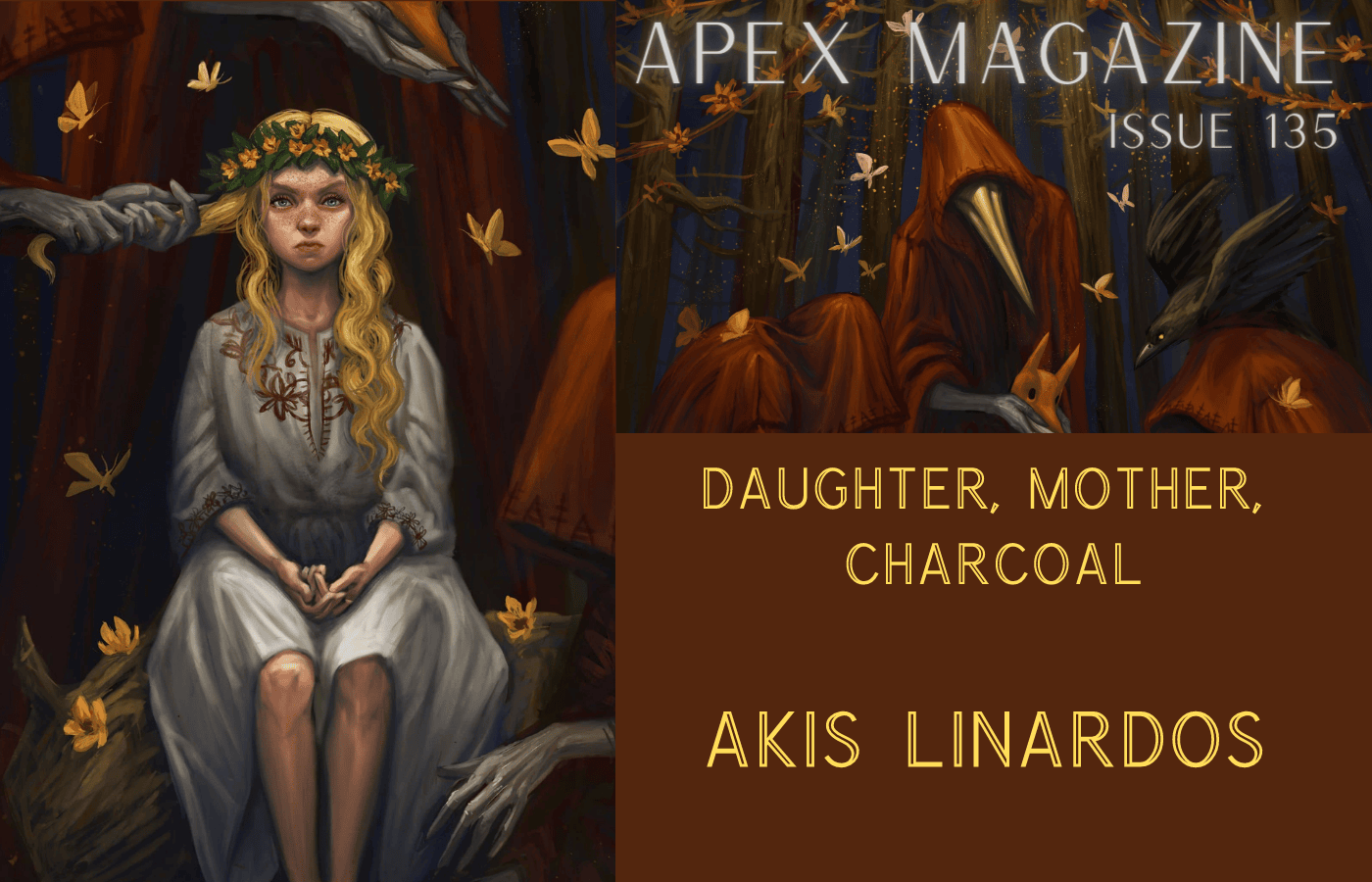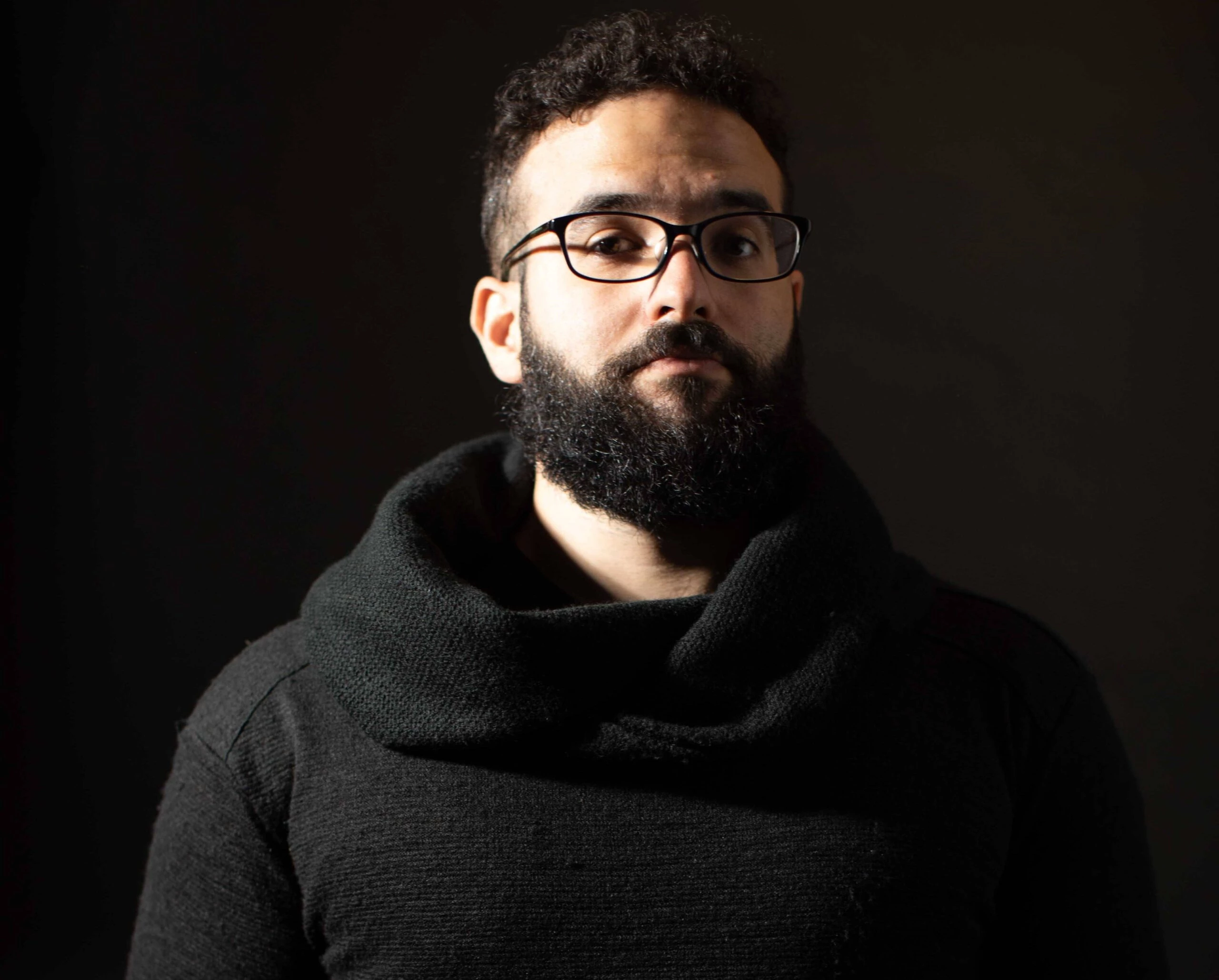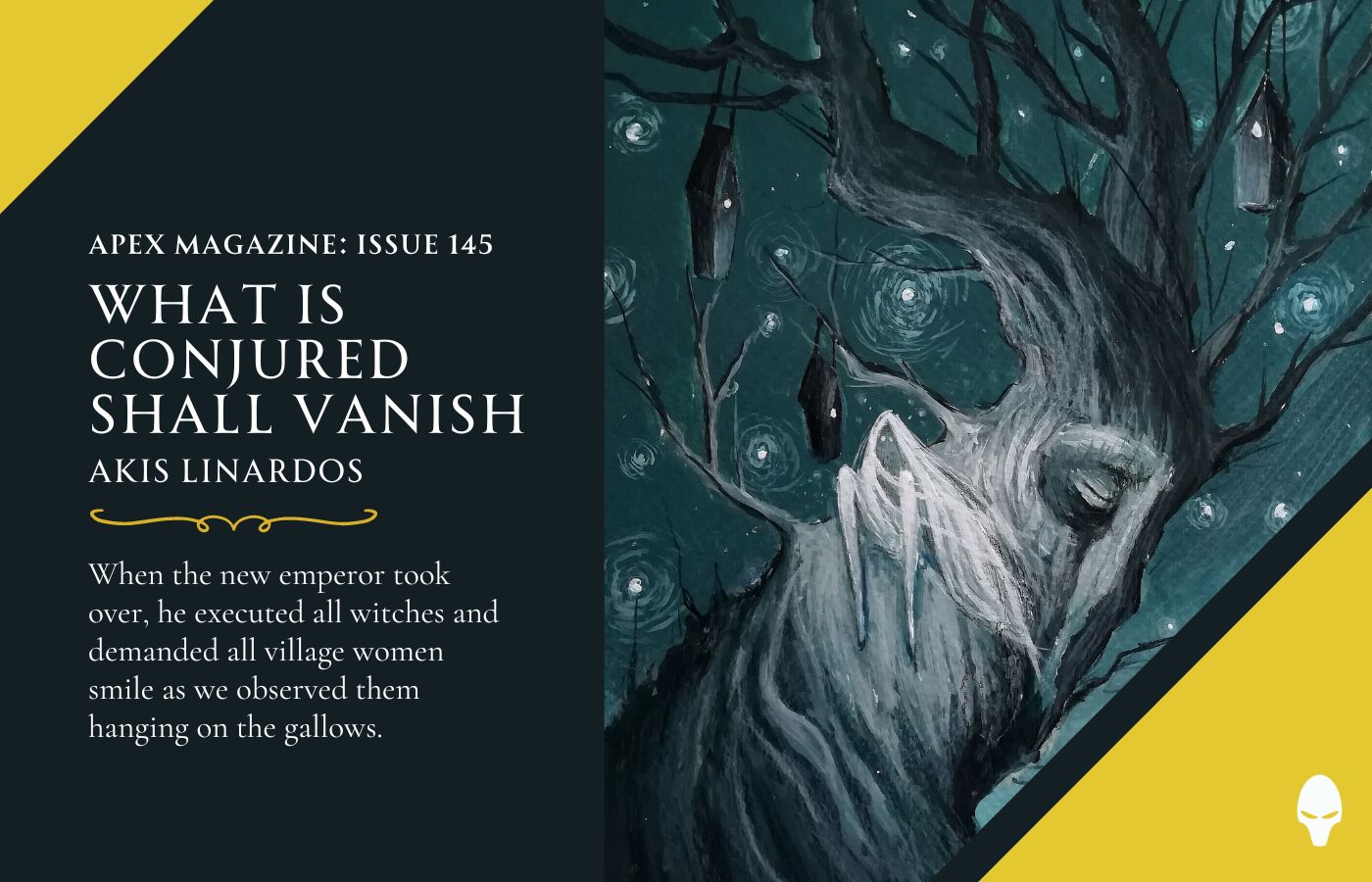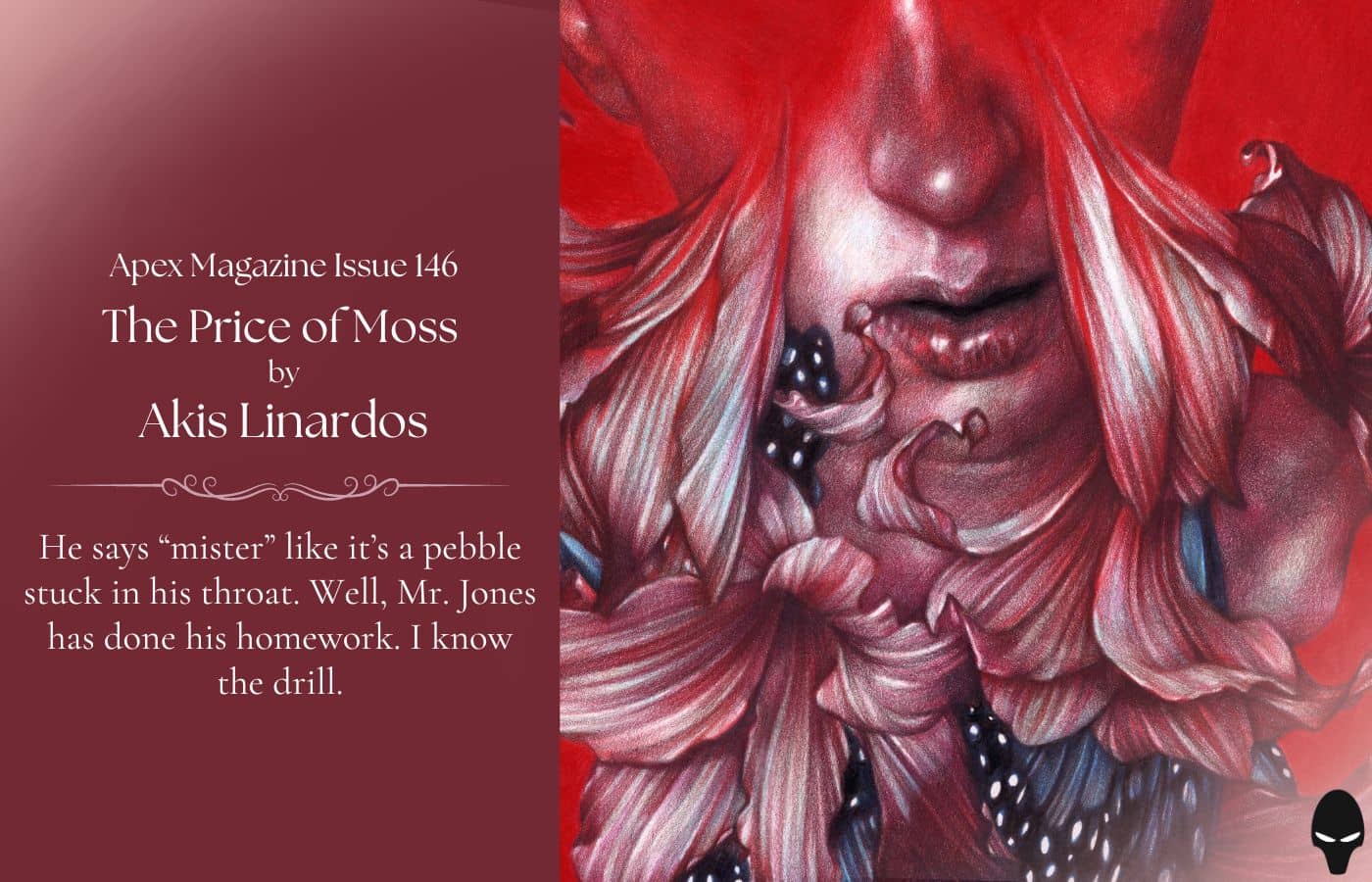
When I was a little girl, Mum would wrap potatoes in aluminum foil, then put them deep into the blazing hearth between the coals and grandma’s bones. Mum would hold them there as the embers charred her hands. The fire feeds from life, she’d tell me. I once tried to mimic her, but the fire seared my flesh and I jumped back with a wail, dipping my hand into my mouth, which only made it burn worse. It comes with age, she said. Your skin grows tough and strong, until it doesn’t feel the pain. I believed her, then. I believed her up until the moment it was my turn to bear the burden of the fireplace.
My world had always been small. Four lung-pink walls that enclosed a kitchen, a hearth, and a table. On the second floor were more walls to separate all the beds of our family into their own rooms. A bed for me, a bed for Dad and Mum, a bed for my aunt. I didn’t remember my aunt though—she vanished soon after I was born. It seemed like we were always just me and Mum. Dad was mostly gone and returned only to sleep and to put food on the table.
I was never supposed to go outside. Even the garden is dangerous, Mum said. Faerie as tiny as your pinky fingers will lure you with their songs, worm through your ears and nose and eat your brain. Like they did your aunt. Be a good girl, stay close to the fire, burn your potato peels and the toys Daddy brings, and stay warm and safe. The fire keeps the faerie away. We have to keep the fire bright. That is our only purpose.
But when I ran out of stuff to burn, boredom would overwhelm me. The four walls became suffocating as I had nothing to do. Perhaps I could find more things to burn if I looked around the garden. Things that burn brightly enough to satisfy that yearning for meaning I had. After all, if the outside was so dangerous, how did Dad go out every day and return so late?
One night, I slipped out of my bed and walked down the stairs, my slippers squeaking with every step. Once I reached the kitchen, I pulled a candle out from the drawers. I found the keys—I had seen Dad’s fake cover on the bottom of the drawer where he stored them—and unlocked the door. My heart thumping, I leaned the candle over the hearth and stole from its fire. It wasn’t my fire, and I could feel grandma’s sooty skull judging me from the corner of the fireplace. Grandma’s dead, I reminded myself. She cannot judge me. I walked out of the house to the floral scents of our garden.
Although I’d never felt so cold before, my body tingled with goosebumps of excitement. A hedge enclosed the garden, blocking my view beyond. Birds chirped in the fig tree. I’d only ever seen them from the window, their chirps muffled by the glass. But now they were sharp and more … real.
I walked to the fig tree and placed my palm on one of its branches. I had burned twigs from it before, I had tasted its fruit. But having the whole of it in front of me and actually touching it? That’s when I felt the first pangs of guilt. I was not supposed to do this.
Faint whispers waded into the garden—a distant song from beyond. My gaze drifted toward a gap at the hedge’s foot. Seemed big enough for me to squeeze through if I crouched. Maybe my aunt was in there, and I could save her with my candle flame.
I glanced over my shoulder at the door, afraid Dad would come bursting out and grab me tight around the wrist until purple bruises appeared on my skin. But I had already come so far. I couldn’t stop here.
I crouched, doming the candle with my left hand to protect the twigs from the fire as I squeezed through the hedge. My hand hurt, but I didn’t care. I could take it. And if the candle scarred my palm, I could hide it by closing my fingers to a fist. What worried me was that my light would go out and the cold would have me or the faerie would worm into my ears. I could hear them louder with every dragged step deeper into this tunnel of twig, grass, and shrubbery. I pushed some twigs aside, the tunnel cleared up, and I gazed beyond.
It was another garden filled with long reeds that swayed in the night breeze. Among the reeds, things glittered in the starlight like scattered mirror shards. I had to squint to see their forms. Limbs thin as toothpicks and arms that vanished to vapors as they twirled and spun and flew away. My heart panged as Mum’s warnings flashed in my mind. I looked at my candle fire, which burned strong still and reassured me I was safe.
The song grew louder and more coherent. I realized they spoke to me, and my hair stood on edge.
Come here.
Stay here.
Follow us into the sweet night.
I did not accept the faerie’s invitation. I knew better than that. But I also never told Mum of what I heard that night, nor on the nights that followed. I kept sneaking out, borrowing fire from the hearth. I would stay there in the alcove formed by the bush and clap my hands and see the faerie spin and vanish in puffs of smoke, until the molten wax would drip onto my skin and alert me that my time was running out.
I asked my mum: Why can Dad go out beyond the garden, away from the warm fire, where faerie buzz, skitter, and sing their terrible songs?
Men, she said, can handle the song. Men have little sacs in their ears that close up and block away all the bad sounds of the world. And so men can go out and bring us food to put on the table while we tend the fire that keeps the faerie song away. She said faerie with a grimace of disgust.
I had no sacs, but I had resisted the song every night for so many nights. I knew it was the hearth’s fire in the candle that protected me. But as I thought about it more, I realized that if this were true, we could bring candles with us and follow Dad on the outside. I wanted to ask about this, but I didn’t. It was a wrong thing I did, going out. Mum would tell Dad, and Dad would hurt me if he knew.
I asked instead if she had ever tried to go outside, and how she was certain that only Dad and other men could withstand the songs beyond the garden. Mum smiled, sat me on the table by the hearth, and told me a story. She said that one day, my aunt walked out of the house and beyond the garden’s borders, and she was lost to us forever. She was out there somewhere still, blood spilling from her ears slowly as faerie screeched, wailed, and buzzed inside her cranium. No fireplace to protect her. No fire to cleanse her skin and grant her sweet release. I later asked Mum how she knew, if she’d never seen this herself, but Mum laughed as if I’d said something so silly I should be ashamed of even asking. Such things were obvious. And so I flushed, feeling ashamed at my stupidity, and never asked again.
Men from the world outside visited at times, tall men with hair coming out of places I didn’t know hair could grow. Some had hair in their ears, too. And I wondered if the hair sucked back into their brains when those fleshy sacs popped out to block the toxic songs of the world.
The men would sit with my father at the table, gobbling those fizzing urine-colored drinks I was never allowed to touch, the same ones he’d throw and smash against walls on the nights he came back home angry or—as Mum would say—possessed by the faerie song. The men patted each other on their back at jokes I could never understand, and they laughed so hard the whole house shook. When I was the target of those jokes and I looked confused because I didn’t understand, they laughed harder. At first I blushed, ashamed. Then I began laughing, too.
It seemed the appropriate thing to do.
As Mum grew older, the skin on her hands grew wrinkled, pink, and tender. Her fingers shrunk, and her arms grew thinner. She said I’d soon have to help her with the fireplace, and that she was growing old, and that now the fire had consumed all of Grandma’s bones, it was hard to keep the embers bright.
I feared it was my fault for stealing all that fire to go out at night and look at the faerie. So I stopped going every night. Instead, I went once every four days. I brought things back with me from the edge of the garden to burn in the fireplace. Ladybugs, snail shells, flowers. I would bundle them up and char them nicely. The lady bugs would squeak, the shells would crack, and the flowers would fizzle out droplets from the edges of their stems and produce tiny puddles. But in the end, all of them crumbled to beautiful gray ash.
It didn’t help enough, though. The fire was fading. Mum blamed my aunt for it. If they were two, they could have kept the fire longer. But my aunt had to go and walk beyond the garden and get herself lost. Now Mum had to keep her hands in the fire for a longer time, to feed the embers with life.
I stopped going out at night entirely, to save fire. But Mum’s hands kept growing smaller every day, and I couldn’t stop thinking that it was my fault. That if I had not stolen all that fire, it wouldn’t have been so bad. I helped her with the fireplace, scooping the ashes her flesh left behind in mounds so that the embers could make the most of them. And as I scooped, I would crane my neck and listen. It was faint, but I could still hear the song of the faerie wading down the chimney.
I helped Mum with the cooking, too. And when all her fingers had dropped from her hands to be kindling on the fireplace, I did all the cooking on my own. I’d roast the chicken thighs on a pan on top of Mum’s burning arms, and then I would set the table for the family. But helping her was not enough to dull my guilt.
And so, one day, I told her what I did and begged forgiveness.
She did not say anything to me. She did not talk to me for the rest of that day. And when Dad came to my room later that night, Mum did not respond to my cries.
When her arms were all gone—devoured to black stubs—Mum had me lay her legs in the fireplace as the rest of her leaned on a chair. She never moved again. More men began coming to the house, and I had to cook for all of them as I had to cook for Dad. I would set the table, and the men would sit, stuffing their mouths with chicken thighs I’d cooked the way Mum taught me. And they always looked at me as I had seen Dad look at Mum in the past, before she lost her hands. As I had sometimes seen them look at the chicken before devouring it.
You have to have one of them, Dad declared one day. To make babies: girls to keep the fireplace warm, boys to go out into the world beyond our walls and bring food to the table. I said I could not decide, for fear that saying I wanted none of these men would anger him.
So, Dad decided for me.
The man didn’t share his name with me. Said it was not important for me to know. It hurt every night when he wormed into my bed. It hurt so much, I felt my insides were going to spill out. Mum said it was supposed to hurt. That pain was the nutrient of life. That I could take it.
And so I did.
There was never a window in my bedroom, only an opaque glass with a tight grid I could pop open to let some air into the room. I would leave it open when the man came every night. I would close my eyes and try to focus beyond the squeak of my bed, beyond the alcohol on the man’s breath. Beyond the pain. And I could still hear it, albeit faint. The song of the faerie.
They were out there. Free.
When the fire had devoured Mum’s legs up to the thigh, she told me to toss the whole of her inside. And so I did. Tossed her right into the fireplace like a log. I could not hear the faerie song anymore. I craned my neck and tilted my head as I tended the fireplace, but I heard nothing.
I put my hand deep into the embers, scooping the bones of my mother’s limbs to the side so that they’d burn slowly. It hurt my skin. Mum had lied about that. The skin doesn’t grow stronger; you just get used to the pain. It was wise of her to lie. Once you accept one pain as part of life, the next comes easier. Better to not be aware of all the pains from the start.
I lied to my daughter, too. I told her the same stories Mum told me, but not quite the same way. When I talked about the faerie, I couldn’t help but tinge my stories with longing. I couldn’t help but coat the fear of it with sweet wonder. What would life have been like if I had listened then, if I had abandoned the fireplace and followed their song beyond the garden?
There came a night when I awoke to muffled squeaks from the stairs. They tapered down and away. I imagined the ghost of my past self walking down those steps. It had been so long. So long since I’d been to that place.
I slipped silently out of bed, leaving the man I called husband to his snoring. The door to my daughter’s bedroom—the bedroom that was once mine—was ajar, and her bed lay empty. I walked down the steps, pulled open the drawer where the candles were stored, and found one was missing. I took another and went to take fire from the hearth. It was my fire now, so it was not stealing, although I could swear Mum’s skull looked at me with disdain from the fire.
I pushed the door open and found that it was unlocked, the key resting in the lock outside.
In the garden, I placed my palm on the fig tree. The feeling was surreal. The man I called husband would bring me figs to taste and twigs to burn, but actually touching the whole thing? It made me happy. But mostly, it made me sad.
I saw the hole in the hedge. I could not hear the song of the faerie from it as I had all those years ago. I crouched and squeezed through the hole. The twigs and thorns tore at my skin—big as I was now—but I did not care. When I reached the end, I saw my daughter there, her skin unnaturally white. I crawled faster, but her candle was already snuffed out. Her hands faded to vapors, then the rest of her. And the vapors waded out of the hole at the tunnel’s end, away from me. I looked beyond, ready to snuff my own light and join her, but my eagerness spilled out in bitter tears.
I could not hear the song. And I could see no faerie in the garden beyond. Only reeds swaying in the breeze under the soft humming of birds whose names I did not know.












